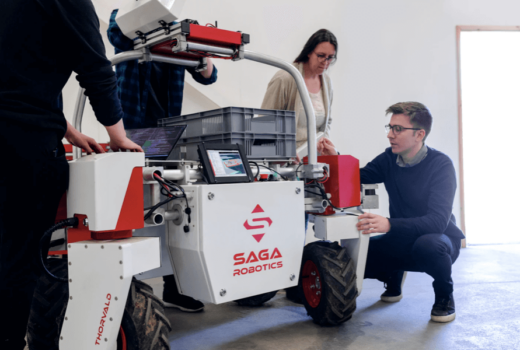Obama, de prof

Op maandag 25 april opent Obama met Angela Merkel het USA-paviljoen op de Messe, direct naast de ‘Wissenstag’ van ScienceGuide, waaraan zijn vrienden van de USA STEM Coalition een wezenlijke bijdragen aan leverden. Op die dag spreekt onder meer Henk Ovink, die voor Obama het plan hielp ontwikkelen om de oostkust van de USA te redden van overstromingen en stormvloeden, via ‘Rebuild by Design’ met een “typisch Hollandse” triple helix aanpak.
Rigorous challenge
Hoe was Obama zelf als kenniswerker en hoger onderwijsman? En hoe werkt dat door in zijn studenten jaren later en in de politiek strijd in Washington van vandaag? Dan Johnson, Class of 2000, uit Chicago vertelt.
“For more than 10 years, President Obama taught at the University of Chicago Law School, an institution known for its commitment to full and vigorous debate from all sides of the intellectual spectrum. It’s where the late Justice Antonin Scalia served as a professor for several years and developed his originalist view of the Constitution. It’s a school where all points of view are treated with respect and are subject to the same rigorous challenge.
And it’s where President Obama will return this afternoon for the first time since moving into the White House to talk with law students about the enduring benefits of an impartial Supreme Court and how the current confirmation process holds the potential long-term consequences for some of our most important constitutional values.
Consider this one
For the first time in recent memory, Senate Republicans are flatly refusing to consider a Supreme Court nomination because they hope another party will win the next election. It isn’t clear whether the Senate will ultimately deny the President’s nominee a hearing or a vote for the entire year, so before positions harden, this is a good time for all of us to step back and think about the broader costs of this potential action to our judiciary.
Professor Obama always insisted on class discussion. He didn’t like to lecture. Rather, he liked to present difficult questions and require students to consider the logical extension of their arguments and decide whether they still maintained their positions.
Professor Obama, like most law professors, used hypotheticals to illustrate his point. So consider this one: What if the next Senate declared that absolutely no Supreme Court appointments would be considered not just in the last year of the President’s term, but for the President’s entire term, regardless of how many vacancies might pile up, because they hoped someone else would be elected four years later?
Precious and powerful
We all want judges that are respected, independent, nonpartisan, and fair to everyone. It’s not easy to create an impartial judicial system when the people who select and confirm our judges are elected and inherently partisan, especially when it requires collaboration between the President and Senate leadership, who often represent different parties. Thus, we rely on political leaders overcoming the political calculations of the moment in order to preserve something that benefits all of us: a truly independent system of justice.
There is something precious and powerful about an independent judiciary, a branch of government that can and must maintain its impartiality in our political system. It’s hard to do. I don’t think we want future law professors to explain how 2016 began a cycle of blatant partisanship in judicial appointments and confirmations. An independent judiciary, born from the heart of our Constitution, is too important to imperil.
That’s one of the lessons I learned from Professor Obama. I hope our Senators take that lesson to heart as well.”
Dan Johnson, Class of 2000, University of Chicago Law School
Meest Gelezen
Vrouwen houden universiteit draaiende, maar krijgen daarvoor geen waardering
Wederom intimidatie van journalisten door universiteit, nu in Delft
‘Burgerschapsonderwijs moet ook verplicht worden in hbo en wo’
Raad van State: laat taaltoets nog niet gelden voor hbo-opleidingen
Hbo-docent wil wel rolmodel zijn, maar niet eigen moreel kompas opdringen



